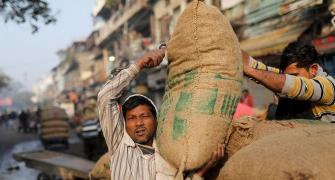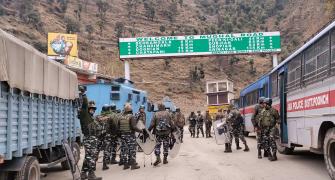The need of the hour is a forceful, no holds barred, comprehensive mandate as opposed to namby-pamby limited measures. The Centre, for its part cannot pass the buck by labelling law and order as a state matter: it must take the lead, says Vivek Gumaste.
Pared down to the basics and shorn of the high sounding ideology mouthed by the Maoists and their sympathizers, the dastardly derailment of the Gyaneshwari Express on May 28 that killed 148 innocent people boils down to an unpardonable act of cold blooded murder.
So is the rampage of violence unleashed in Dantewada in recent days. And so was the barbaric decapitation, last October of police inspector Francis Induwar. Let us not sanctify these heinous crimes with even an iota of rectitude lest it temper our rightful outrage and shackle our response.
A clear vision coupled with a no-nonsense approach devoid of sentimentalism is the key to good governance: a definite desideratum in this government. Nowhere is this more conspicuous than in the United Progressive Alliance's handling of the Maoist insurgency. Flummoxed by the ethical conundrum that is inherent in this contentious issue the government has tied itself into knots and oscillates aimlessly between inchoate measures at best and complete catatonia at worst with disastrous consequences.
Union Home Minister Chidambaram's stunning disclosure of only having a 'limited mandate' is testimony to the utter state of confusion and lack of political will prevailing in government circles vis-à-vis this burning problem.
True this is an intricate, multi-faceted issue with no straightforward answer or a canned solution. True there is a kernel of truth to the Maoists' contention that the Adivasis are a disadvantaged lot. Bastar which lies in the heart of Maoist territory ranks as one of the poorest districts: basic amenities are wanting, good roads are scarce, medical facilities negligible and durable means of income almost non-existent. But that is where the truth begins and ends: a detail the government must discern.
Everything beyond the Adivasis' abject poverty is a chimera: a skillfully orchestrated charade that serves the interests of vested groups with ulterior motives. The revolutionary and seemingly altruistic zeal of the Maoists masks a more sinister design: namely the usurpation of political power; social crusade being a convenient front. Contributing to this obfuscation, intentionally or inadvertently are the so-called intellectuals whose heart wrenching outpourings on second reading are best reclassified as misguided narratives or deliberate misinformation.
At the outset we need to decipher the DNA of the Maoist movement and unravel its corrupt configuration, to overcome our ethical inhibitions and formulate an effective strategy to eradicate this scourge. Central to this introspective analysis is a series of inter-related questions.
Firstly, do the Maoists truly represent the socially backward sections and can we accept them as the exclusive voice of the economically beleaguered tribal community? For an accurate response we need to rewind to the pre-2005 era, when anti-Naxalite operations were at a minimum and the Salwa Judum was non-existent: two factors consistently held up by the Maoists to justify their violent carnage.
Despite any overt provocation, Naxalites even then indulged in an orgy of violence: executing people at will to induce a fear psychosis, stealing livestock, carting away young women to serve their carnal needs and hampering developmental schemes to keep the Adivasis trapped in poverty.
These crimes were unambiguously documented by the NHRC enquiry committee initiated by the Supreme Court in response to a writ petition filed by prominent Indian intellectuals including Nandini Sundar and Ramachandra Guha among others against the State of Chattisgarh (Writ petition No. 250/07, Supreme Court). Below are some excerpts from the NHRC report:
"Events leading up to the formation of Salwa Judum in June 2005.
1.22. Similarly, in order to create a fear psychosis amongst the tribals, many villagers were also brutally murdered in Jan Adalats after accusing them of being police informers.
1.23 In order to sustain themselves, the Naxalites forced the villagers to part with their agricultural produce, livestock and even cash.
1.26. No hand-pumps, roads, electric poles, school buildings, etc. were allowed in the villages under their control.
1.28. ... that many of the tribal girls were sexually exploited by the Naxalites.
All the above mentioned factors cumulatively led to a strong feeling of revolt amongst the tribals. As a result, they openly came out in defiance of the Naxalites in June 2005."
Therefore it would be naive on our part to juxtapose the aspirations of the Maoists with the needs of the Adivasis and perceive them as interchangeable entities. A more accurate interpretation of the relationship is that of an exploiter and the exploited. Once this myth of the Maoists being champions of the underprivileged is demolished, the task of dealing with them becomes easier.
Moving forward for the sake of debate, let us assume for a moment that the Naxalites are in fact sincere advocates for the indigent amongst us. Does that put a stamp of approval on their modus operandi? Can an honorable cause and a potential utopian outcome justify violent means? And is violence consistent with the norms of democracy? The answer can only be in the negative.
Every nation and society is a seething cauldron of inequities waiting to spill over, especially so in a pluralistic society like ours. Religions invariably collide, castes clash, regional interests come eyeball to eyeball and contrasting ideologies confront each other almost on a daily basis. To forge a consensus from this cacophony our forefathers exhibited extraordinary foresight in choosing a democratic path.
Democracy advocates the use of the ballot in lieu of the bullet to settle issues. There can be no compromise with to this basic dictum of democracy whatsoever despite the seemingly insurmountable deficiencies in our system. To do so would be to open up a Pandora's Box with every perpetrator of violence brandishing a cause to justify his/her action; a sure recipe for anarchy. When we condone violence from the Maoists, how can we validate our stand against terrorists who invoke the carnage of Gujarat 2002 or the demolition of the Babri masjid for their misdeeds? A country with double standards looses all credibility.
Thirdly it is important to ascertain what fuels this movement? Is it driven by purely by the sweat and grit of suffering masses craving for socio-economic egalitarianism as some would like us to believe? Or is the ground reality quite different?
The Maoist uprising, in actuality, draws sustenance from a host of dubious resources like extortion, links with international terrorists like the Lashkar-e-Tayiba and patronage from India's detractors namely China. The most despicable aspect of this rebellion however is the exploitation of children; mass indoctrination of impressionable children initiates a process that recruits and keeps thousands of vulnerable children trapped within an unrelenting and rigid system and is the key operational mechanism of this movement as indicated in a 2008 report by Human Rights Watch titled "'Being Neutral is Our Biggest Crime.'"
"All former Naxalites interviewed by Human Rights Watch stated that they joined different Naxalite wings when they were children. Naxalites organize children between ages six and twelve into bal sangams (village-level children's associations).
Depending on their skills and aptitude, children from a bal sangam are "promoted" to other Naxalite departments: sangams (village-level associations), CNMs or chaitanya natya manch (street theatre troupes), jan militias (armed informers who travel with dalams), and dalams (armed squads)."
Summarising, the Maoist movement is a charlatan; not truly representative of the tribal community; a senseless violent movement with no logical end point that is sustained by illegal money power, child abuse, coarse intimidation and the polemics of arm chair intellectuals with over inflated egos more concerned with the primacy of their ideas than objectivity.
Therefore, it is crucial to first divorce the plight of the Adivasis from the shenanigans of the Maoists. Additionally, at this point in time, this insurgency has assumed alarming proportions and stands poised to ratchet up the pressure to a dangerous next level that has the potential to destroy our democracy and replace it with an anarchy that does good to no one; the despotic regime spawned by the Khmer Rouge in Cambodia in the 1970's and the chaos engendered by the Maoists in Nepal should serve as a warning.
To begin, a decree of amnesty for the misguided youth among the ranks in tandem with a last and final call to the Maoist leadership to come to the negotiating table would be an acceptable option; failing which the Maoist campaign must be crushed with single minded determination bereft of any distracting influences.
The need of the hour is a forceful, no holds barred, comprehensive mandate as opposed to namby-pamby limited measures. The Centre, for its part cannot pass the buck by labelling law and order as a state matter: it must take the lead. The ball is in the government's court. But is the UPA upto it? That is the million dollar question.




